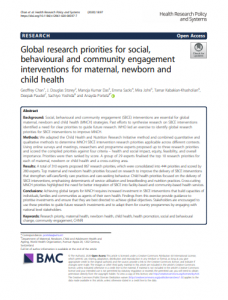
Background
Social, behavioural and community engagement (SBCE) interventions are essential for global maternal, newborn and child health (MNCH) strategies. Past efforts to synthesise research on SBCE interventions identified a need for clear priorities to guide future research. WHO led an exercise to identify global research priorities for SBCE interventions to improve MNCH.
Methods
We adapted the Child Health and Nutrition Research Initiative method and combined quantitative and qualitative methods to determine MNCH SBCE intervention research priorities applicable across different contexts. Using online surveys and meetings, researchers and programme experts proposed up to three research priorities and scored the compiled priorities against four criteria – health and social impact, equity, feasibility, and overall importance. Priorities were then ranked by score. A group of 29 experts finalised the top 10 research priorities for each of maternal, newborn or child health and a cross-cutting area.
Results
A total of 310 experts proposed 867 research priorities, which were consolidated into 444 priorities and scored by 280 experts. Top maternal and newborn health priorities focused on research to improve the delivery of SBCE interventions that strengthen self-care/family care practices and care-seeking behaviour. Child health priorities focused on the delivery of SBCE interventions, emphasising determinants of service utilisation and breastfeeding and nutrition practices. Cross-cutting MNCH priorities highlighted the need for better integration of SBCE into facility-based and community-based health services.